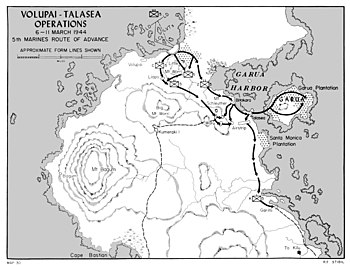
Back Operation Appease German Batalla de Talasea Spanish Talaseako gudua Basque Bataille de Talasea French Talasea-i csata Hungarian Pertempuran Talasea ID Битва за Таласеа Russian
| Battle of Talasea | |||||||
|---|---|---|---|---|---|---|---|
| Part of World War II, Pacific War | |||||||
 Map depicting the US Marine operation, March 1944 | |||||||
| |||||||
| Belligerents | |||||||
|
|
| ||||||
| Commanders and leaders | |||||||
|
|
| ||||||
| Units involved | |||||||
| Strength | |||||||
| ~3,000 | 596 | ||||||
| Casualties and losses | |||||||
| 17 killed and 114 wounded | 150 killed | ||||||
The Battle of Talasea (6–9 March 1944) was fought in the Pacific theater of World War II between Japanese and Allied forces. Dubbed "Operation Appease" by the Allies, the battle was part of the wider Operations Dexterity and Cartwheel, and took place on the island of New Britain, Territory of New Guinea, in March 1944 as primarily US forces, with limited Australian support, carried out an amphibious landing to capture the Talasea area of the Willaumez Peninsula, as part of follow-up operations as the Japanese began withdrawing east towards Rabaul following heavy fighting around Cape Gloucester earlier in the year. The assault force consisted of a regimental combat team formed around the 5th Marines, which landed on the western coast of the Willaumez Peninsula, on the western side of a narrow isthmus near the Volupai Plantation. Following the initial landing, the Marines advanced east towards the emergency landing strip at Talasea on the opposite coast. Their advance south was stymied by a small group of Japanese defenders who prevented the US troops from advancing quickly enough to cut off the withdrawal of the Japanese force falling back from Cape Gloucester.